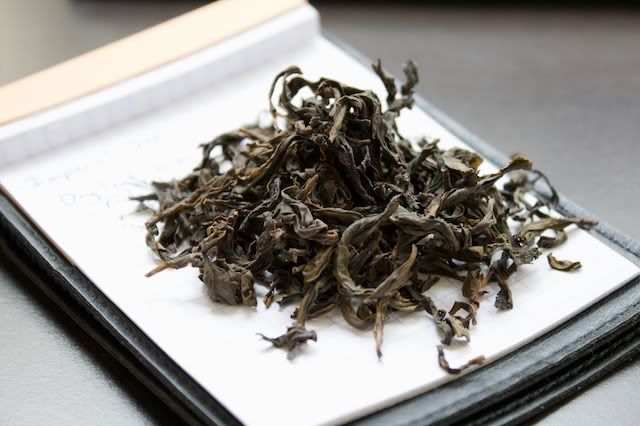Origin: Wuyi Mountains, Fujian province, China
Year: 2008
Vendor: Jing Tea Shop (Product page)
Price: $78 (100g) / $23.50 (25g)
I feel like a broken record saying this, but thanks go to Adrian for this sample (he sent me so damn many!). At 78¢/gram, this is definitely one of the most expensive teas I have had the pleasure of trying. Not surprisingly, it is a very good tea, especially for one so new.

The dry leaf's aroma is gorgeous: chocolate, caramel, cassia, and maybe some nutmeg. The best part though was its richness. Really, wow. When wet, the leaves give off charcoal and fruit notes, a pretty typical scent for a young Wuyi.

The first infusion is best characterized as "lively." It is rich, fruity (think tropical fruit, like kiwi), floral, and thick in the mouth. The second infusion has a hint of charcoal but is mostly the same as before. By the third infusion there is a nice oiliness developing on my lips, and a relaxing cha qi feeling. In the next few infusions the fruity/floral liveliness is replaced by spice and the classic yancha texture. All of the infusions are a vibrant orange color— very purty.

There probably would have been some more charcoal if I brewed it stronger, but whatever. This was a very impressive yancha, though it definitely does not taste like a heavily roasted one if that is what you are looking for. As Jing Tea Shop says, this tea is ready to drink now and really doesn't need any aging. I don't pretend to be an expert on aging oolongs, but I don't get the feeling that this one would age well. Even more reason to drink it now! Yum!


5 comments:
Great review! I purchased and enjoyed some of the 2007 harvest of this tea, but was a little disappointed in the brewing durability. How long did this pot go for you? I could be persuaded to buy more of this tea if it were a bit more patient.
Wu Yi Mountain teas generally should occupy 50% of your teapot prior to brewing.
Each steeping should be no more than 20 seconds for the first 5 or 6, then increasing to maybe 30-40 seconds.
Just a thought :-)
I love Wu Yi teas, and am looking forward to picking up some Da Hong Pao soon.
wow! new posts!
great!
Zero the Hero,
Thanks! It wasn't the most durable, but for a new DHP it wasn't bad, probably 7 or 8 good infusions.
Pein,
No offense, but I hate the word "should" when it comes to tea. I do not use any standard times when I brew, I react to what the tea tells me it needs. I have gotten excellent results with anywhere from 1/4 full to 3/4 full depending on the tea. Thank you for the advice though, I'm sure you had good intentions when you gave it.
The reason I didn't use as much leaf as normal here is that the sample size was fairly small, but I didn't want to say that and make people think Adrian wasn't generous, as this is an extremely expensive tea.
Hanny,
Thanks, I know I can be pretty lazy when it comes to posting sometimes. I'm trying to be better! :D
Brent
Brent,
No offence taken. I used 'should' due to several trials undertaken at various instances in time, and the proportions and times indicated were intended as a starting point or reference point when it comes to my experience with this particular tea type.
It's just that short sharp infusions with more leaves, less room in the pot would appear to help intensify aromas, and tease out a bit more patience. As the leaves unfurl, the tighter packed conditions mentioned also help concentrate flavour without having to extend brewing time.
I'm sorry if this all sounds clinical, but it really isn't. Pot after pot, brew after brew, some things just become habit.
I find it easier to start from a known quantum and adjust from there.
Given some of the things you've mentioned in your post, it would be nice to see how this DHP behaves in a few years.
Post a Comment
Note: Only a member of this blog may post a comment.